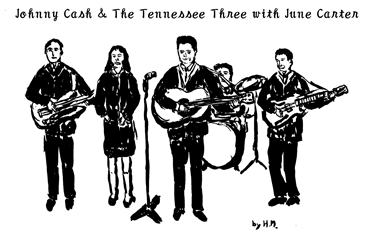

Although I had already heard his name, The Wanderer, the last song of U2's album "Zooropa"Areminded me of him for the first time. This was the most idyosyncratic presence among the songs of U2's electronica-tinged years. Backed by the progressive but moderate sound and the hymn-like chorus, he sings with a voice of serene, deep and cool resonance, which occured to my mind the image of a parson with a gun. Johnny Cash was reappreciated by those in the rock field in 1990s, but I was not so absorbed in his music, because I was interested in Rhythm & Blues or Soul of from '50s to '70s.
And then I got "The Sun Records Collection", a box set of various artists, and listened to the songs. Best known as the digger of Elvis Presley, before he arrived Sun Records recorded songs mostly performed by blacks, who were bluesmen like B.B.King or The Howlin' Wolf and men of R&B like Rufus Thomas or Ike Turner. Elvis himself was very influenced by such black music, and the songs he sang to his taste were splendid. After Elvis, however, Sun Records became prominent as a label of white rockabilly men like Jerry Lee Lewis or Carl Perkins. Johnny Cash stood out in those circumstances. It was true that his delivery of singing came from country, but the riffing which was brought out by his acoustic guitar and the backing of electric guitar and upright bass, was characteristically expressed as 'boom-chicka-boom-chicka', which has light after-beats. Cry! Cry! Cry!, Folsom Prison Blues and Get Rhythm have the groove of rushing into the wilderness and the voice wiping off sentiments. Both I Walk The Line, a gimmick of moving the tune, and Guess Things Happen That Way, with a sweet chorus, are tightened by a stringy voice. After listening to them, I dare say that you cannot deny having other Johnny Cash songs.
Next I pick up UK-published "The Very Best of The Sun Years", which contains 30 songs. Except for Ballad of a Teenage Queen, added with a strange arrangement of pop and pastoral chorus, you should be enchanted by the full-scale coolness of a guy in Big River, which sounds nice edged guitar, Hey Porter and There You Go and so on. Then "The Essential Johnny Cash", with hits of Columbia years, have many treasures such as duets with June Carter, Cash's future wife (Jackson, Daddy Sang Bass and If I Were a Carpenter), Bob Dylan(Girl from The North Country), and lives at prisons. That's very kind to beginners like me. I will dig deeper the songs on and after the Columbia years.
Many of Johnny Cash tunes are likely to be for the oppressed. While he sings The Ballad of Ira Hayes, about an Indian who returned from the World War II, he just declares that he sings for such people on Man in Black. A series of live at prisons were done from his sympathy. The live at his early hit's home , "At Folsom Prison", reveals a low fence between him and the audience, that is, prisoners. In addition to the selection of songs which overlaps the so-far life of each prisoner, the sound makes me feel confused but raw owing to the confusion : their stirring handclaps rises when Cash forgets a part of his lyrics, or his voice "Can I have a glass of water?" and so on are left unerased, or prisoners shower boos upon the likes of MC . Its sequel "At San Quentin" consists mainly of his hits and it is completed as a show, however, Johnny Cash is a man of fine sense. In spite of the live by 'courtesy' of the prison he sang the resenting San Quentin and won applause of prisoners, which might never happen upon Japanese traditional enka singers even if they do the same consolations. A Boy Named Sue is the finest because it shows the mood of "he arrives down on us" by its humolous lyrics and some four letter word which was sensored with the 'peeea' note on the single at the time. While rock produced innovational sounds and told dreams and fell into drugs, Johnny Cash recovered from drug addiction and sang tunes in a settled way. It is interesting that there were such movements in contrast at the same time.
Johnny Cash in his later days released substantial sides from American Recordings, which is owned by Rick Rubin, the producer of old schools such as Run D.M.C. and loud rocks. There is a film "Dead Man Walking"'s score, In Your Mind, on a CD I had had since before. Tim Robbins, an actor and this film's director, felt the existence of Johnny Cash important in the context of the film, however, especially in Japan he was overshadowed, it seems to me, by the other artists and I also almost forgot him impolitely. After listening to a variety of his tunes I got aware of his virtue. On his acoustic and simple "American Recordings" and "Unchained" , backed by Tom Petty & The Heartbreakers, show you his wonderful sounds of today. Besides the former two, "Solitary Man" and "The Man Comes Around" shine themselves with his unique interpretations of Beck, Nick Cave or Nine Inch Nails and so forth. The rhythm of 'boom-chicka-boom-chicka' flowing all through his career feels like inviting the spirits of the bounded of this world to the farther. (2004/07/27)(2005/11/27)